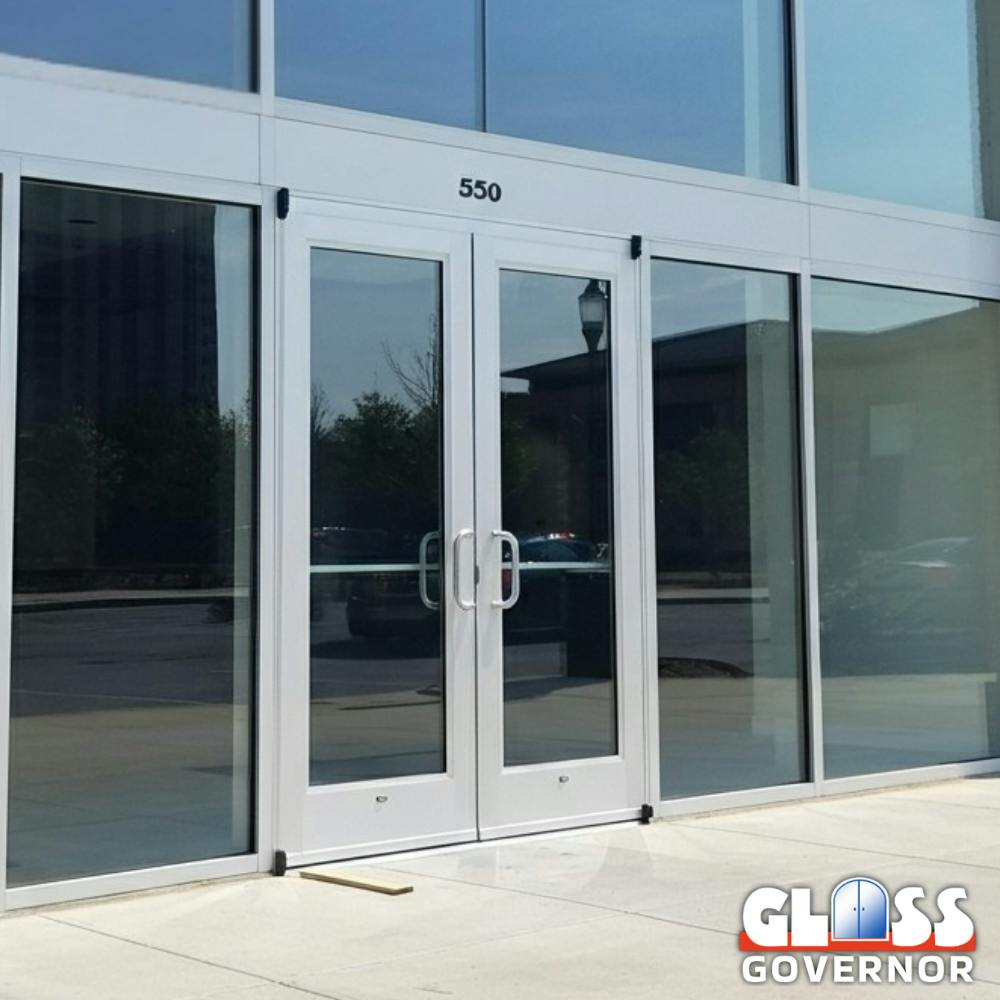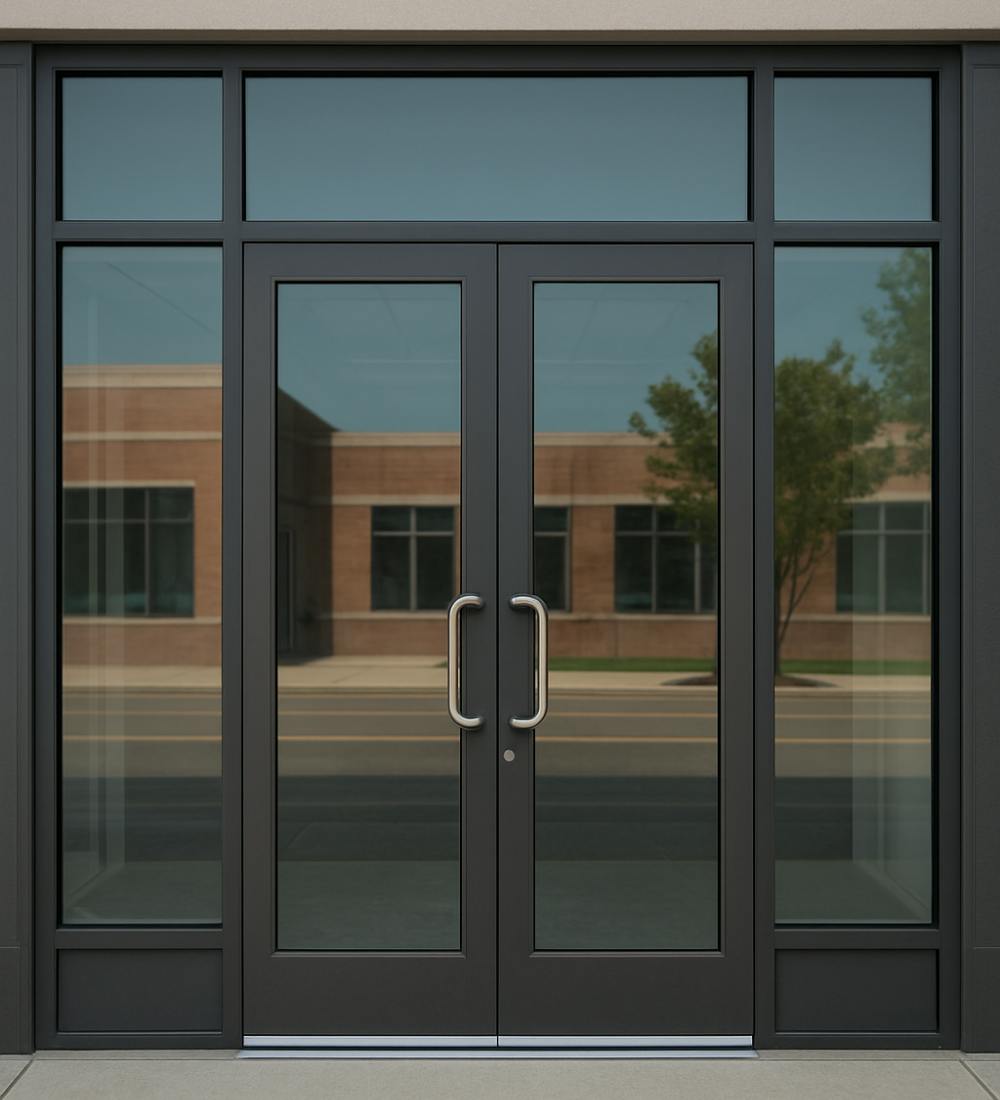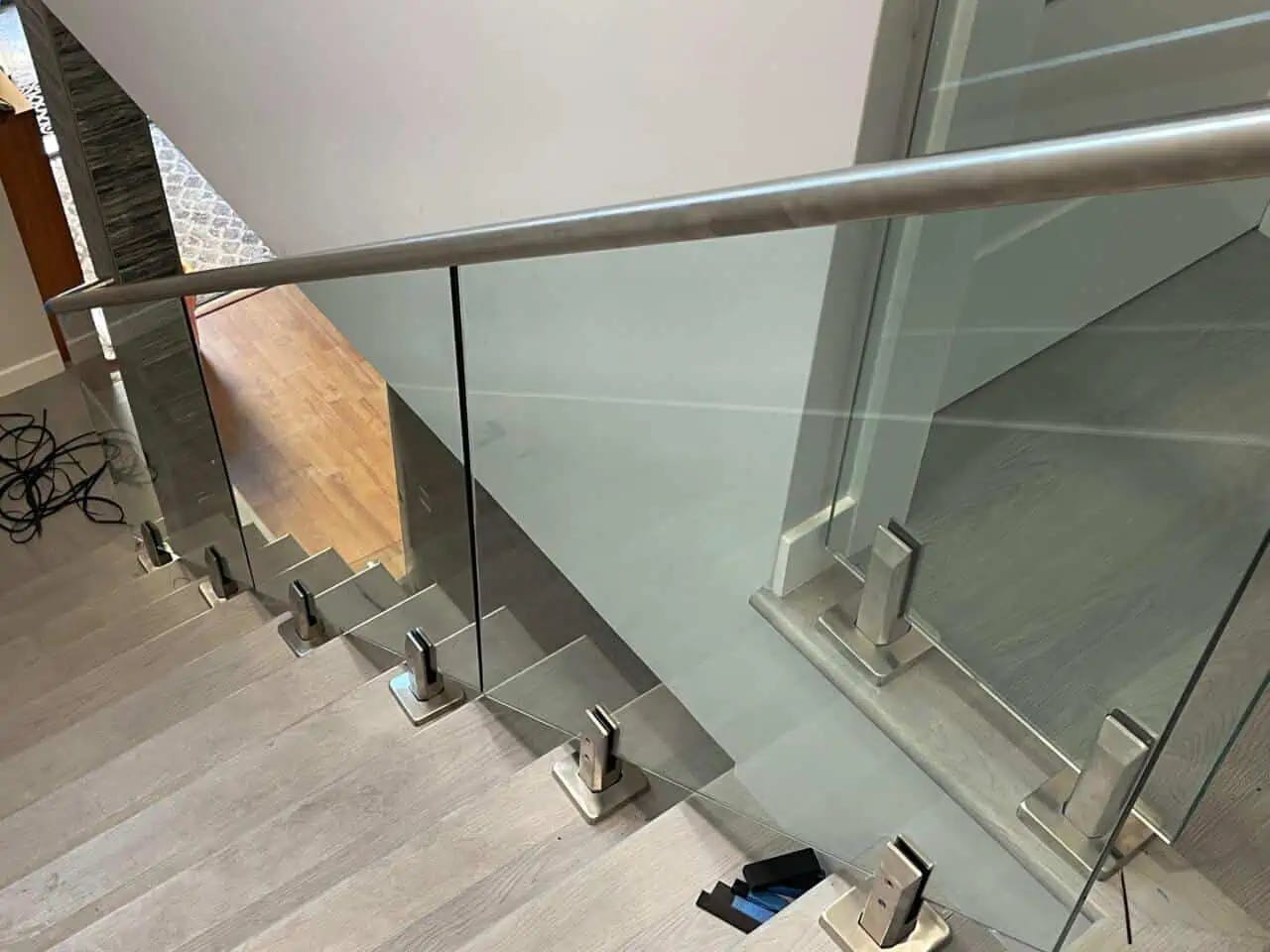Grid glass partitions combine the elegance of traditional divided-light design with contemporary functionality: better natural light distribution, acoustic control, and energy savings of 15-25%. Atlanta businesses from tech startups to law firms choose grid partitions because they balance openness with subtle privacy, support multiple design styles, and deliver measurable returns on investment.
Remember when open offices were supposed to revolutionize how we work? The reality turned out differently. Constant noise, zero privacy, and that uncomfortable feeling of being watched all day sent many companies back to the drawing board.
But going back to solid walls isn’t the answer either. Nobody wants to return to the dark, divided offices of decades past.
Grid glass partitions offer something better—a middle path that preserves transparency and natural light while creating the structure people actually need to do their best work.
What Makes Grid Glass Partitions Different
Think of grid glass partitions as the architectural equivalent of a well-tailored suit. The visible frames—usually aluminum or steel—divide larger glass expanses into smaller sections, creating clean geometric patterns that add visual interest without blocking sightlines.
Unlike completely frameless glass walls that can feel sterile or exposed, grid partitions have character. The frames break up direct sightlines just enough to make spaces feel defined without feeling closed off. You still get all the benefits of glass (natural light, visual connection, spatial flow), but with structure that makes people more comfortable.
The grid framework itself becomes part of the design language. A tech company in Midtown might choose thin black steel frames for an industrial vibe. A financial services firm in Buckhead could opt for bronze aluminum that conveys established professionalism. The same basic concept adapts to completely different aesthetics.
This versatility explains why we’re seeing grid partitions everywhere from converted warehouses along the BeltLine to newly constructed office towers in Sandy Springs.
The Natural Light Advantage
Here’s something most people underestimate: how much natural light affects how you feel at work.
Research from the International Well Building Institute found that employees working near windows with good daylight exposure report 51% less eyestrain, 63% fewer headaches, and 56% less drowsiness. Those aren’t small differences. That’s the gap between struggling through your afternoon and actually being productive.
Grid glass partitions help spread natural light to interior spaces that would normally sit in permanent shadow. Conference rooms in the building core, interior offices, break areas—all of these typically windowless zones can benefit from borrowed light when you use glass partitions strategically.
The energy impact adds up quickly. According to the U.S. Department of Energy, daylighting strategies can cut lighting energy consumption by 30-50% in commercial buildings. That translates directly to lower utility bills, smaller carbon footprints, and reduced strain on HVAC systems.
For businesses serious about sustainable office design, grid glass partitions represent one of the most effective interventions you can make. The investment pays back through reduced operating costs and improved employee well-being.
Privacy Without Isolation
One concern about glass walls: don’t they make everything feel exposed?
Sometimes, yes. Completely clear, frameless glass creates what people call the “fishbowl effect”—that sense of being constantly visible that can feel uncomfortable when you’re trying to concentrate.
Grid partitions address this in a subtle but effective way. The frames themselves provide visual interruption. While you can still see through the glass, the grid structure breaks up direct sightlines enough to create psychological privacy. Your brain registers the partition as a boundary, not just empty space.
This becomes especially important in spaces like HR offices, executive meeting rooms, or areas where client confidentiality matters. You get the benefits of glass without making people feel like they’re on display.
Acoustic Performance That Surprises People
“But glass is loud, right?”
Not necessarily.
When you specify acoustic laminated glass—two panes bonded together with a sound-dampening interlayer—you can achieve Sound Transmission Class (STC) ratings of 40-45. That’s roughly equivalent to a standard interior wall.
The grid framework actually helps with acoustic performance. By dividing large glass expanses into smaller sections, the frames reduce panel resonance and vibration. The structural support also enables the use of thicker, heavier glass, which blocks sound more effectively.
For businesses in converted warehouse spaces or buildings with high ceilings—common throughout Atlanta’s Westside and Old Fourth Ward—acoustic control becomes crucial. Companies dealing with open-plan office noise challenges find that properly specified grid partitions create distinct acoustic zones without sacrificing visual openness.
Smart Glass Integration
Here’s where things get interesting: you can integrate smart glass technology within traditional grid frameworks.
Electrochromic and PDLC glass panels switch between transparent and opaque states electronically. Install these within grid partitions and you get instant privacy control—participants press a button before meetings, the glass clouds over, and it clears again afterward. No blinds, no curtains, no mechanical systems to maintain.
The juxtaposition works surprisingly well. The classic grid framework provides architectural permanence, while the switchable glass delivers 21st-century functionality.
Beyond privacy control, smart glass technology reduces solar heat gain by up to 25% in its darkened state, cutting HVAC costs on top of lighting savings. The U.S. Green Building Council reports that properly implemented smart glass systems can reduce total energy consumption by 15-25% in commercial applications.
Energy Efficiency in Atlanta’s Climate
Atlanta’s hot, humid summers and occasional winter cold snaps make energy efficiency particularly important.
Low-emissivity (Low-E) glass coatings reduce heat transfer by 10-50% depending on specification. During summer, Low-E glass reflects infrared heat back outside, keeping conditioned air inside. During winter, it reflects heat back into the building, reducing heating costs.
The cumulative effect—reduced lighting loads, improved HVAC efficiency, better thermal performance—adds up to significant operational savings. Many businesses find that energy-efficient glass solutions pay for themselves within 5-7 years through reduced utility costs alone.
Real-World Applications
Grid glass partitions work across surprisingly diverse business types:
Professional Services Firms in Buckhead use grid partitions to maintain the professional appearance clients expect while creating modern, collaborative workspaces for staff. The traditional grid aesthetic signals establishment and trustworthiness.
Tech Companies in Midtown and Alpharetta appreciate how grid partitions create defined zones without sacrificing the open, connected environment that fosters innovation.
Medical Offices throughout Roswell and Johns Creek use grid partitions to separate consultation areas while maintaining visual supervision for patient safety. Acoustic glass options support HIPAA privacy requirements.
Creative Agencies favor grid partitions for their aesthetic versatility. The visible framework photographs well and creates interesting backdrops, while transparency supports creative collaboration.
For businesses exploring commercial glass partition options, grid systems often emerge as the ideal compromise between completely open and fully enclosed layouts.
Cost Considerations and ROI
Budget-conscious businesses want specifics: what will this actually cost?
Grid glass partitions typically run $75-200 per square foot for complete installed systems. Standard configurations with clear tempered glass and aluminum frames fall toward the lower end. Premium specifications—acoustic glass, custom steel frames, smart glass panels—move costs higher.
That might sound expensive compared to drywall. But consider the complete picture:
Energy savings reduce lighting and HVAC costs month after month. Many businesses recover 20-30% of installation costs within five years through utility savings alone.
Productivity gains from better natural light exposure link to improved employee performance, though this is harder to quantify precisely.
Flexibility value means when you need to reconfigure your space later, glass partitions relocate far more easily than drywall, avoiding future renovation costs.
Property value improves because commercial spaces with modern, flexible layouts command higher rents and attract quality tenants more readily than dated offices.
Lifespan matters because properly installed glass partitions last decades with only routine cleaning. Drywall typically needs replacement or significant repair every 10-15 years.
When you account for these factors, grid glass partitions often deliver better value than traditional construction, particularly for businesses that prioritize employee experience and operational flexibility.
Installation Timeline and Process
Professional installation matters with grid glass partitions. The process typically starts with an on-site assessment covering structural considerations, existing architecture, and design preferences.
Fabrication timelines depend on customization level. Standard grid partitions with clear or Low-E glass usually take 3-4 weeks from order to delivery. Custom configurations with mixed glass types or smart glass integration may extend to 6-8 weeks.
Actual installation moves quickly. A typical project—say, enclosing a conference room or creating several private offices—often takes 1-2 days with minimal disruption to surrounding work areas.
Working with an experienced contractor who understands local building codes makes a difference. Atlanta’s permitting requirements, structural considerations for different building types, and climate-specific specifications all factor into successful installations.
Maintenance and Longevity
One practical question: how much work do glass partitions require?
Less than you’d think. Regular cleaning keeps them looking good—standard glass cleaner and microfiber cloths work fine. For businesses wanting minimal maintenance, anti-spot coatings repel water and fingerprints, extending time between cleanings.
The frames need occasional attention. Aluminum frames require essentially no maintenance beyond cleaning. Steel frames may need periodic inspection for any finish wear, though powder-coated options resist scratches and corrosion well.
Compared to drywall that can suffer dings, holes, water damage, and eventual deterioration, glass partitions essentially maintain themselves. The glass doesn’t degrade, rust, rot, or support mold growth—valuable properties in Atlanta’s humid climate.
Most professional installations come with warranties covering glass, frames, and hardware for 5-10 years. With proper care, grid glass partitions can serve for decades without replacement.
Why Now Makes Sense
Several factors make this a particularly good time for businesses to consider grid glass partitions:
Workplace redesign momentum means many companies are rethinking office layouts. Rather than reverting to old designs, they’re creating spaces that support both focused work and collaboration. Grid partitions enable this balance.
Energy cost awareness continues climbing. Investments that reduce long-term operating costs make more sense than ever.
Employee retention remains competitive. Companies that create appealing workspaces with natural light and acoustic comfort have an advantage in attracting and keeping good people.
Proven technology means both the glass systems themselves and smart glass integration have matured significantly. You’re implementing well-established solutions with track records of reliable performance.
Making the Decision
If you’re considering grid glass partitions for your Atlanta business, start with these questions:
What problems are you trying to solve? Better natural light? Noise reduction? Flexible space planning? Clear goals guide appropriate specifications.
How important is acoustic control? Standard glass provides minimal sound blocking. Laminated acoustic glass costs more but delivers substantially better performance.
Do you need privacy control? If instant privacy matters, smart glass integration might justify the premium. For spaces where transparency works fine, standard glass costs less.
What’s your design aesthetic? Grid sizing, frame materials, and glass options should complement your existing architecture and reinforce your brand identity.
Professional consultation helps sort through options. On-site assessments identify structural considerations, code requirements, and design opportunities you might not recognize on your own.
Moving Forward
Grid glass partitions represent a meaningful upgrade from both fully open plans and traditional solid walls. They solve real problems—poor natural light distribution, acoustic challenges, inflexible layouts—while creating the kind of environment that helps people do their best work.
For Atlanta businesses ranging from established professional firms to growing tech companies, these systems offer a proven path to better workspaces that balance transparency with structure, openness with privacy, and aesthetic appeal with functional performance.
The investment delivers returns through reduced energy costs, improved employee satisfaction, and increased property value. Perhaps more importantly, it creates spaces where people actually want to spend their time.Ready to explore how grid glass partitions might work for your Atlanta office? Visit Glass Governor to see examples, discuss options, and schedule a consultation. Or check out our Google Business Profile to see completed projects throughout the metro area.









